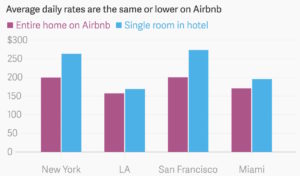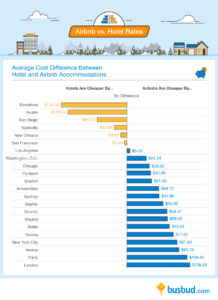The time when the hospitality industry encountered sharing economy.

Sharing economy is disrupting the hotel industry. What are the tangible effects and how are hotel chains (not) reacting?
Hospitality Industry
The hospitality industry is a healthy one, it experienced overall growth in 2015 and continuing positive performance in 2016. RevPar (Revenue per available room) increase as well 6.6% and the trend is expected to continue in 2016 at 5.8% [1]. Hotels, however, are starting to experience first-hand the disruptive force of the sharing economy, force on which companies like Airbnb have been building their success.
Sharing Economy
Sharing economy is built among others on the idea that unused value is wasted value. Information Technology and Social Media now enable the opportunity to connect people in need of those resources that would otherwise be idle with the individuals holding the extra capacity [2]. Airbnb was the first mover in the peer-to-peer hospitality market and since its debut in 2008 has been growing to estimate over $10 billion now exceeding the evaluation of hotel chains like Hyatt. [3]
Airbnb Value Proposition
Airbnb vision is to offer access to a community for home renting. Affordable staying is undoubtedly a significant portion of value proposition for Airbnb. A report from ShareBetter indicates that renting and entire home on Airbnb costs on average as much as a hotel room in 20 big US cities. [4]
The below chart highlights cost difference between hotels and Airbnb in 22 cities worldwide. Airbnb is the cheaper option in 16 cities. [5]
Additionally, Airbnb positioned itself as a provider of a unique experience, the one that corporate hotel cannot offer. Airbnb mission is to open the door not only to a home but to personal connections, cultures and experiences.
Hotel VS Airbnb
CEOs of major long-established hotel chain have been downplaying their new competitors, despite offering less flexibility and facing higher costs. [6]
Marriott International CEO Arne M. Sorensen said: “We don’t think it’s a significant factor in terms of impacting our business today, and are optimistic that it won’t become one, but we’ll have to watch it and see.” [6]
HVS hotel management however, paints a slightly different picture. According to their estimate
hotels lose approximately $450 million in direct revenues per year to AirBnb. Number of room booked on Airbnb currently estimated at 2.8 million is expected to increase to 5 million per year by 2018. The impact has been significant on the hotels workforce, 2,800 jobs have been lost, corresponding to $200 million in income for hotel employees. [3]
A study carried out by Boston University built a model to determine the impact of Airbnb on hotel revenue in Austin [3]. The impact is significant: 8-10% decrease in hotel revenue. The most affected hotels are lower-priced ones and those not catered to business travelers. Additionally, Airbnb competition affects hotel pricings during peak of demand. Hotels, historically able to adjust their prices up in periods of high demand are now facing the threat of oversupply and their ability to raise prices has been impaired.
Hotels’ slim edge
Hotel still hold competitive advantage in key areas [7]
- Consistency of quality
Customer expectation are usually consistently met by hotel chains. Airbnb could close this gap by improving quality of their review and learning customers’ taste and behaviors. Given the huge amount of data is collection, this goal seems easily at reach.
- Reward programs
Hotels encourage guests’ stickiness through their reward point system. That’s applicable especially to business travelers who tend to enjoy a consistent experience, enhanced by premium services. Furthermore, reward points can be later spent on leisure travel, contributing to a positive cycle for the hotel chain. There are, however, no barrier for Airbnb to implement a similar system and enjoy its benefits especially once in the business segment.
- Business travelers
Business travelers contribute to a large percentage of their revenue and offering a steady and forecastable income flow. Consistency of quality and reward programs plus relationship with corporate still make hotels the preferred option for non-leisure travel. However, hotels might make a fatal mistake ignoring the potential threat (think Uber in the transportation industry). Recently launched airbnbbusiness is the company first move to test the water in the segment leveraging convenient locations, great amenities and affordable price [8]
Next steps
Hotels are facing new threats and their response so far has been either denial or pressure on establishing a regulatory framework. Similar strategy has been adopted by the transportation industry and so far, was not able to stop Uber and similar services from spreading.
I believe hotels should accept the reality of a changing environment and put together an internal strategy to address the changes rather than relying on regulators. Maintaining their corporate accounts will only be a start… Blackberry taught us.
(784 words)
Sources:
[1] https://www.cloudbeds.com/articles/hospitality-industry-trends-to-watch-in-2016/
[2] https://en.wikipedia.org/wiki/Sharing_economy
[3] http://cs-people.bu.edu/dproserp/papers/airbnb.pdf
[5] https://www.busbud.com/blog/airbnb-vs-hotel-rates/
[7] https://www.yahoo.com/style/airbnb-backlash-8-reasons-why-hotels-are-still-127008329517.html





Interesting post about hotel industry!
As you mentioned slightly on your article, I think the effect of Airbnb would be different to the different segments of hotel industry. Luxury hotel chains would be less affected from the advent of Airbnb because they can provide different values such as customized service and easy access to swimming pool and fitness center.
However, lower-priced hotels need to figure out ways to compete with Airbnb because their only merit have been low cost. In my opinion, attracting business travelers and adopting reward program are not suitable options for many lower-priced hotels. Close association with travel agency could be a possible option because Airbnb cannot host many number of customers at once. Are there any other competitive-edge for lower-priced hotels?
Awesome post! I think you’re right to point to the examples of Uber and Blackberry as a warning that the threat is very real. For further research, you should look at a company called onefinestay (where Phil worked) that does Airbnb for the ultra high end luxury market and provides the guest with hotel-like amenities and concierge service. I think they might pose the greater threat to the corporate travelers that are the lifeblood of the hotel business. However, given your point that it’s the lower-end hotels that have been most hurt by Airbnb, I am not sure. On the rewards point – I agree with your concern. I think this is something that Airbnb could easily do.
Interesting article, though I don’t necessarily agree that hotels have to adapt. In fact, I think Airbnb may be at a peak in terms of popularity because of many of the reasons you suggested. Consistency of quality is of huge importance. I have stayed at several airbnb’s over the past year and had very mixed experience, and the few bad experiences have led me to seek hotels first. I also think the regulatory restraints, such as charging a bed tax for Airbnb, are catching up very quickly and are already in effect in some states. For a hotel to change their model is an extremely capital intensive move, and they will alienate existing loyal customers. Additionally, the sharing economy only accounts for 10% of overnight stays currently and may diminish in the near future as the fad dies, as regulatory pressures increase, as people are detracted from inconsistency, etc. For these reasons, I don’t see this model likely to change in the near future, or at least until Airbnb gains further significance.
Thanks for a great post! I agree that the lower priced hotels really have few or any competitive advantages against Airbnb, since they cannot compete on quality and they are not suitable for business travelers either. In order for these hotels to survive, I believe they need to consider drastically changing their business models to leverage technology as Airbnb has, and perhaps also build their own online platform like Airbnb and cut out more of their physical cost structures. Another suggestion is to have the smaller, budget hotels form an alliance with a rewards program that is now more valuable because of the larger network of hotels. The alliance can have one platform serving all these smaller hotels and be able to offer more choice for customers and also benefit from economics of scale to compete on price with Airbnb. Of course, it’s easier said than done and it may be difficult for different small hotels to cooperate together or be able to build a platform as efficiently as Airbnb has.